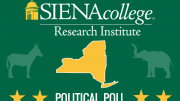Must Be Cited As: The Times Union/Siena College Upstate Education Poll
First in a new series: “How We Live: The Fabric of Upstate Life”
Jury Out on Common Core Long-Term; Upstaters Call for Timeout on Implementation and Current Testing
Local Schools Strongest in College Prep; Weakest in Getting Students Ready for Workforce; Huge Support for Vocational Training
Teachers Get Good Grades across Upstate; High on Quality and Doing What is Best for NY’s Students
Lack of Parental Involvement, Bullying, Student Behavior Top Long List of Problems
Loudonville, NY., Fifty percent of residents agree that in the long run the new Common Core Learning Standards will increase student success while 44 percent are unconvinced according to The Times Union/Siena College Poll of Upstate New York residents sponsored by Gramercy Communications released today. This Education Poll, the first in an ongoing series of studies that will focus on “How We Live: The Fabric of Upstate Life”, finds that 82 percent of upstate residents believe that the implementation of the Common Core has been rushed resulting in confusion among everyone involved and 58 percent say it is time to take a timeout as we are testing too much, too soon and kids are going to get demoralized.
Asked to rate their local schools on the job they are doing in preparing students for college, to be citizens, with the skills they will need as adults and for the workforce, half of residents give local schools either a good or excellent rating on only college preparation and civics while 61 percent say that schools are doing no better than fair or poor in getting our young people ready for the workforce. An overwhelming 94 percent of residents are in favor of increasing the availability in public schools of vocational training.
Sixty-four percent of all residents, and 73 percent of parents with children in public schools rate the overall quality of their teachers as either excellent or good. Only 13 percent of Upstaters think that public school teachers are paid too much. Eighty-eight percent of residents completely or somewhat trust teachers in their local schools to do what is best for New York’s students at a rate far higher than that of other people and institutions important in education including Governor Andrew Cuomo, Education Department Commissioner John King, the Board of Regents, and the State Legislature.
Given a list of 18 potential problems facing schools today, the three that residents see as most serious are lack of parental involvement, bullying and students behaving poorly. Following closely on a long list of concerns across Upstate are getting and keeping good teachers, low test scores, emphasizing the wrong subjects, low expectations for student achievement and student readiness to learn. Of least concern are the condition of school buildings, lack of computers, sufficient physical education and the quality of teacher instruction.
“While not every Upstater we spoke with works in education nor even has a child in school today, everyone seems to have strong opinions about public education,” according to Dr. Don Levy, SRI’s Director. “Less than half grade the overall quality of education as good or excellent, and fewer than a third think that the education children are receiving in New York today is better than they received as a child.”
“Assessing the last three years of all that has gone on in education, over seventy percent say that we either moved New York schools in the wrong direction or had little impact and looking to the future, Upstaters are split right down the middle as to whether or not the quality of public education will improve over the next five year,” Levy continued. “But, it will be difficult for policy makers and educational leaders to make sense out of a citizenry that simultaneously has a plurality saying we don’t spend enough on education and a majority opposed to paying more in taxes to provide additional funding to schools.”
Common Core, Testing and Teacher Evaluations
Upstate New Yorkers say that they are paying some or a great deal of attention to the implementation of the Common Core (73 percent), the current use of standardized testing (75 percent) and, to a slightly lesser degree, the new teacher evaluation plan (63 percent). Asked whether they support or oppose the way each of these initiatives is being currently used in public education in New York, by 46 to 23 percent they oppose the implementation of the Common Core, by 43 to 29 percent they oppose the current use of standardized testing and they are equally split, 30 percent opposed and 28 percent in favor, on the new teacher evaluation plan.
“With virtually one voice, upstate citizens say that the implementation of the Common Core has been rushed and a majority, when considering not only the standards but also the tests that assess student progress on them, say it is now time to ‘slow down and take a time out.’ A majority even agree that the only ones that will benefit from the Common Core are the companies marketing the new textbooks and tests. Still, when asked whether they think in the long run student success will increase or that students will benefit from statewide standards and learning objectives, Upstaters stand split right down the middle. The jury is out on the Common Core and current testing but this jury is watching carefully,” Levy said.
Who do you trust to do what is best for New York’s students?
In addition to the 88 percent of citizens that somewhat or completely trust the teachers in their local schools to do what is best for students, 71 percent trust their local school board and majorities trust the New York Board of Regents (59 percent), the teachers’ unions (57 percent) and Governor Cuomo (50 percent). Only 43 percent somewhat or completely trust Commissioner King who is unknown to 20 percent of Upstaters and fewer, 41 percent trust the New York State Legislature.
Support for New Ideas
Of six ideas that the survey tested, the most popular was increasing the availability in public schools of vocational training (94 percent support). Seventy-four percent of residents support increasing the amount of state funding to local school districts so as to provide more special education services. The remaining four ideas – paying more in taxes, providing teachers with financial incentives tied to student success, increasing the length of the school day and increasing the length of the school year – all receive a majority of opposition. Only increasing the number of school days, especially among Democrats and urban residents, approaches a fifty-fifty consideration.
“Upstate New Yorkers care deeply about the education our students are receiving. While many would like to see more dollars go to education, only four in ten are ready to pay more in taxes. But, their comments point more to getting parents involved, keeping students safe and supporting the good work of committed teachers than to throwing money at the concerns. Will we move forward? Right now they are on the fence. Showing them and their children how the Common Core and the associated testing will help would be a step in the right direction,” Levy said.
About Siena College Research Institute
Founded in 1980, the Siena College Research Institute conducts regional, statewide and national surveys on business, economic, political, voter, social, academic and historical issues. The surveys include both expert and public opinion polls.
About the Times Union
The Times Union is the leading newspaper in New York’s Capital Region, and timesunion.com is the region’s most highly trafficked media Web site. The Times Union also publishes several magazines (518Life, Women@Work and Explore) and hosts major regional events, such as the Times Union Home Expo, at the area’s premier arena, the Times Union Center.
About Gramercy Communications
Gramercy Communications is an independently-owned strategic communications firm based in the historic River Street area of Troy. Gramercy provides public relations, public affairs and marketing services to a wide variety of clients across upstate New York. The firm’s existing clients collectively represent over $5 billion in economic activity in New York State.
“The Gramercy team takes great pride in living and doing business in upstate New York,” said Tom Nardacci, President and Founder of Gramercy Communications. “As a strategic communications firm, we want to have an acute understanding of what issues are important to the residents of the Capital Region and beyond. We are proud to sponsor this poll, which will provide valuable insight on upstate New York-centric topics, many of which are being wholly explored in detail for the first time.”
About WMHT-TV
A trusted community resource for over half a century, WMHT Educational Telecommunications uses the power of non-commercial public television, radio, the web and other media to enrich the lives of more than a half million households throughout eastern New York state and portions of western Vermont, Massachusetts and Connecticut. Television broadcast channels include WMHT-DT (17.1), WMHT-Create (17.2) and WMHT-World (17.3). Radio stations operated by WMHT include WMHT-FM 89.1 & WRHV-FM 88.7 (classical public radio) and WEXT 97.7 (AAA public radio). WMHT also operates RISE, a radio reading service for the visually and print disabled. In addition, WMHT offers numerous community outreach and family learning initiatives that inspire, educate and entertain for a lifetime.
This Times Union/Siena College Poll was conducted June 1 – 5, 2014 by telephone calls to 874 residents of the 51 counties of Upstate New York. It has a margin of error of +/- 3.3 percentage points. Data was statistically by age, and gender to ensure representativeness. Sampling was conducted via random digit dialing to landline and cell phones weighted to reflect known population patterns. The Siena College Research Institute, directed by Donald Levy, Ph.D., conducts political, economic, social and cultural research primarily in New York State. SRI, an independent, non-partisan research institute, subscribes to the American Association of Public Opinion Research Code of Professional Ethics and Practices. For more information, call Don Levy at (518) 944-0482. For survey cross-tabs and frequencies: www.Siena.edu/SRI/Research.





